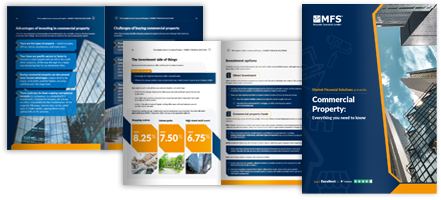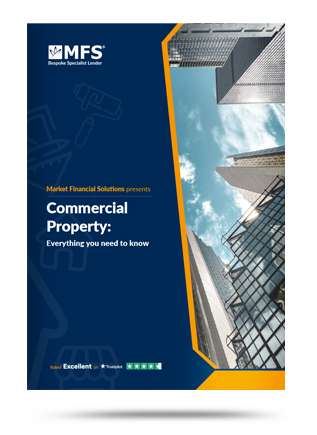Disclaimer
MFS are a bridging loan and buy-to-let mortgage provider, not financial advisors. Therefore, Investors are encouraged to seek professional advice.
The information in this content is correct at time of writing.

The last few years have completely upended the commercial property world. The pandemic, and its aftereffects, forced many to rethink their need for commercial space. As flexible working emerged, commercial property valuations took a hit.
To refresh on the basics: a commercial property valuation is an appraisal of a building that is used for business purposes. This covers many different types of properties and industries. Common examples include offices or retail stores. Then there are the more niche options, such as laboratories or medical centres.
Generally, a commercial property valuation will provide interested parties – banks, investors, tenants – with an understanding of the market value of the underlying asset. For investors, seeing the recent shifts in commercial property values has likely made many nervous.
Changing working patterns, along with a challenging economic climate, pushed commercial values downwards. The RICS UK Commercial Property Index registered a 14.4% decline in the months leading up to late 2023. At the same time, the Office for National Statistics revealed a 2.7% drop in commercial property prices.
But, despite the hardships faced in this market, a recovery could be on the horizon. Also, while the need for offices may have declined, other sectors such as logistics and retail are still seeing strong demand.
With the outlook looking promising, many investors may turn their attentions to commercial valuations over the coming months. In advance of this, we thought we’d highlight the key elements of what go into commercial property valuations.
Commercial property valuations – the methods
Commercial property valuation methods can vary. Given the diversity in the commercial market, there is no one-size-fits-all approach to valuing property’s potential. Its value will be determined by what an investor hopes to generate from it, and what the wider market expects.
There are a few common valuation methods utilised in the commercial market, however.
Income approach
Investors (or their valuers) seeking to generate income from their commercial property may want to utilise the income approach. This method calculates a property’s value based on the income it may generate.
This approach follows a 3-step process. First, a net operating income (NOI) needs to be calculated – this is the gross income, minus any operating costs such as maintenance. Then, the capitalisation rate needs to be calculated. To get the cap rate, one takes the NOI, and divides it by the purchase price (to get a percentage result).
Finally, to get an estimated property value, the NOI needs to be divided by the cap rate. The gross rent multiplier is another method which focuses on income. Here, the property selling price could be divided by the annual gross rental income. The result tells the investor how long it would take to pay off the property – the lower the number, the faster they’ll make a profit.
Cost approach
There is also the cost approach. Here, one calculates the approximate cost of a commercial property based on how much it would cost to build a similar building on the same plot of land. The formula for this is: land value + (building costs – depreciation) = property value.
Outside of these valuation options, there are also market-based methods, like the sales comparison approach, value per square foot, and rateable value. Generally, many of these commercial property valuation methods could be used in tandem to get the roundest view possible of a property’s potential.
Also, investors need to be aware of the factors that are outside of their control, but could still impact valuations. The state of the economy, desirability of the location, condition of the property, shifts in interest rates, and more can all play their part in lowering, or raising a property’s value.

Costs and fees
Valuation costs will vary but for relatively simple cases, commercial valuations can start from £500. Though, those are not the only cost commercial property investors will face along their journey.
Commercial mortgages may include arrangement fees, legal fees, early repayment charges, monitoring fees, and more. Individually these charges may be low, but they can stack up.
Arrangement fees, for example, could be anywhere between 0.5% – 2% of the loan amount. Legal fees may also end up costing thousands.
Given all the potential costs involved, it’s important to work with a lender that’s clear on its fees from the outset. At MFS, we underwrite our mortgages from day one. Meaning, our borrowers will never be hit by any unexpected, costly surprises.
Why investors should start thinking about commercial property valuations
Pessimism reigns supreme in the mainstream press when it comes to the commercial world. But, much of it appears unfounded or at least, misplaced. The logistics, life sciences, retail, and other industries may see investment growth over the coming year according to analysis from Savills.
Even offices, which apparently sit empty across the UK, averaged 4.2% growth per annum in the post-covid years. Those with capital to spend appeared to take notice of all this.
In 2023, the “world’s super-rich” ploughed much of their wealth into British offices, shops, and warehouses. As buying opportunities emerged, billionaires and wealthy families accounted for 68% of all commercial property purchases in London.
What’s more, a recent survey of global real estate fund managers found that 56% of investors felt optimistic about the outlook for UK and European commercial real estate. Some 70% plan to increase their exposure to the UK market this year.
The commercial market still has challenges to overcome. But alongside those challenges are also possible opportunities. As investors come to realise those opportunities, we’ll be there to support them with specialist bridging finance, and bespoke BTL mortgages.

The Complete
Commercial Property Guide
Everything you need to know
- Extensive introduction
- Lease types
- Regulations & responsibilities
- Finance



